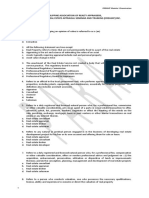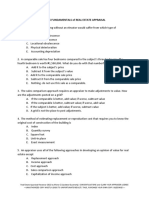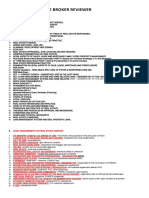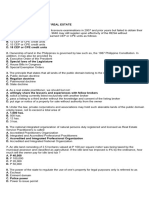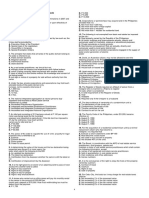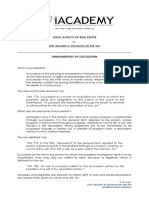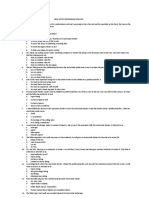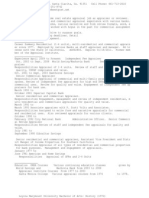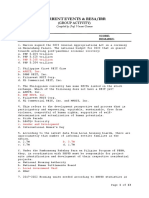Test Exam Appraisal
Test Exam Appraisal
Uploaded by
Jay ElizanCopyright:
Available Formats
Test Exam Appraisal
Test Exam Appraisal
Uploaded by
Jay ElizanOriginal Description:
Copyright
Available Formats
Share this document
Did you find this document useful?
Is this content inappropriate?
Copyright:
Available Formats
Test Exam Appraisal
Test Exam Appraisal
Uploaded by
Jay ElizanCopyright:
Available Formats
PRELIM TEST QUESTIONS
REAL ESTATE APPRAISAL AND ASSESSMENT IN MANAGEMENT
INSTRUCTION: Do not write on the test paper. Write your best answer by writing the question
number and the answer opposite to the question number. Example: Q1 – a.
=======================================================================
1. To an appraiser, the definition of value is:
a. The relationship between the thing desired and the potential purchaser
b. The ability of one commodity to command other commodities in exchange
c. The worth, usefulness, or utility of an object to someone for some purpose
d. A good guy
2. An appraisal is:
a. A fixed of value
b. An estimate or opinion of value
c. A statement of value
d. A value determination
3. The two types of real estate appraisals are:
a. Formal and informal
b. Informal and intuitive
c. Structural and formal
d. None of the above
4. Informal appraisals are performed by:
a. Only by appraisers
b. Only by skilled real estate practitioners
c. All consumers
d. Without the use of inspection
5. Informal appraisals rely mostly on:
a. A secret value formula
b. Facts and figures
c. Supporting data
d. A value formula
6. Besides assisting the public by advising on questions of value, appraisers are tasked to:
a. Provide unbiased and objective opinions of value
b. Make market transactions conform to economics
c. Prove or disprove value estimates made by others
d. None on the above
7. Legal transactions that often require appraisals include all of the following except:
a. Income tax casualty loss estimates
b. Property damage lawsuits
c. Company liquidation or mergers
d. Private feasibility studies
8. Some of the important reasons for studying appraisals are:
a. To improve your value estimate skills
b. To help you pass the real estate agent, broker, appraiser examination
c. To improve your ability to communicate with appraisers
d. A, b, and c
Prelim Test Real Estate Appraisal and Assessment in Government Page 1
PRELIM TEST QUESTIONS
REAL ESTATE APPRAISAL AND ASSESSMENT IN MANAGEMENT
9. Which of the following acts of an appraiser would not be in violation of USPAP?
a. Perform an appraisal and collects a fee for services on a property in which the
appraiser disclosed an interest
b. Perform an appraisal and base the fees on a percentage of the value estimate
c. Accepts and assignment without disclosure of lack of previous knowledge or
experience of a character to qualify for the assignment
d. Pays a fee to another for referring clients for appraisal assignment without disclosure.
10. An objective kind of value that can be assigned to the items and properties bought and sold in
the market is called:
a. Value in use
b. Value in exchange
c. Economic value
d. Potential value
11. Refers to a person who possesses the necessary qualifications, license, ability and experience
to execute or direct the valuation of real property for the government.
a. Assessor
b. Appraiser
c. Consultant
d. Valuer
12. Subject to the provision of the labor code, a corporation or partnership may hire the services
of a registered and licensed real estate appraiser on commission basis to perform real estate
services, the real appraiser shall be deemed _____________.
a. Independent Contractor
b. Full-time employee
c. Part-time employee
d. Dependent contractor
13. Under the code of conduct and ethical standard, the real estate practitioner in relation to the
government is expected to perform as such except:
a. Secure all the necessary license, permits and authority
b. Pay any and all taxes, fees, dues, levies or charges
c. Encourage, abet, tolerate, or participate in the aversion or illegal reduction in the
payment of all taxes, fees, dues, levies or charges
d. Should not offer or agree to pay, split or rebate any commission or fee.
14. Real properties are considered as immovable properties. This kind of real property is
immovable in the sense that it is attached in a fixed manner to be an integral part thereof.
a. Real by nature
b. Real by incorporation
c. Real by destination
d. Real by analogy
15. The following are lands classified as public domain, except:
a. Agricultural land
b. Forest or timber land
c. Residential land
d. National parks
Prelim Test Real Estate Appraisal and Assessment in Government Page 2
PRELIM TEST QUESTIONS
REAL ESTATE APPRAISAL AND ASSESSMENT IN MANAGEMENT
16. Refers to a price at which a property may be sold by a seller who is not compelled to sell, and
bought by a buyer who is not compelled to buy.
a. Market value
b. Fair Market Value
c. Assessed Value
d. Value in exchange
17. The act or process of determining the value of property as of a specified date for specific
purpose done only by licensed practitioners.
a. Appraisal
b. Pricing
c. Costing
d. Assessment
18. A young married couple was looking for a home and found one that they liked very much,
but after hearing the high asking price, they decided not to buy it. Their reason for not buying
was probably based upon the principle of:
a. Substitution
b. Conformity
c. Highest and Best Use
d. Anticipation
19. The form and supporting data in an appraisal vary mainly with the:
a. Preference of the appraiser
b. Purpose of the intended use of the appraisal
c. Legal restrictions
d. The types of the value sought
20. A subjective kind of value that can be determined only by the owner of the property or by a
biased valuer is called:
a. Value in exchange
b. Value in use
c. Listing Value
d. Assessed value
21. Which of the following is not effective without purchasing power?
a. Utility
b. Supply
c. Demand
d. Levels of wages
22. In appraising an old house, the following are not important:
a. Purpose of the appraisal
b. Suitability of the site
c. Original cost
d. Physical condition of the improvement
23. The appraisal process involves 6 steps, the first of which is to:
a. Define the problem
b. Choose an appropriate value approach
c. View of the property
d. None of the above
Prelim Test Real Estate Appraisal and Assessment in Government Page 3
PRELIM TEST QUESTIONS
REAL ESTATE APPRAISAL AND ASSESSMENT IN MANAGEMENT
24. The “total living area” of a residential structure is measured by:
a. Exterior measurements including walls and finish
b. Interior measurements only
c. House and garage area combined
d. None of the above
25. Which of the following might be classified as tangible rather than intangible amenities:
a. Pride of ownership
b. A sense of security
c. Free Rent
d. Work satisfaction
GOOD LUCK!!!
Prelim Test Real Estate Appraisal and Assessment in Government Page 4
You might also like
- Key Selection Criteria ResponseDocument6 pagesKey Selection Criteria Responseapi-238382395No ratings yet
- 3.09 Set 3 Mock Exam ReaDocument5 pages3.09 Set 3 Mock Exam Reabhobot riveraNo ratings yet
- Simulation 1 With Answer KeyDocument9 pagesSimulation 1 With Answer KeyREB2020100% (2)
- Mock Exam Part 1Document25 pagesMock Exam Part 1Rheneir MoraNo ratings yet
- Review Questions-Market Data ApproachDocument9 pagesReview Questions-Market Data ApproachLuningning CariosNo ratings yet
- Real Estate Finance & Investment Chapter-01Document7 pagesReal Estate Finance & Investment Chapter-01sadNo ratings yet
- Key ANS. Book4.4 Valuation and Appraisal RDL 55q 10p 2014Document11 pagesKey ANS. Book4.4 Valuation and Appraisal RDL 55q 10p 2014Noel RemolacioNo ratings yet
- Legal Aspect of Sales, Mortgage and LeaseDocument15 pagesLegal Aspect of Sales, Mortgage and LeaseErika Lusterio100% (1)
- Fundamental of Property OwnershipDocument5 pagesFundamental of Property OwnershipJosue Sandigan Biolon SecorinNo ratings yet
- Brokerage PracticeDocument26 pagesBrokerage PracticeElwin F. BuenaventuraNo ratings yet
- General Steps of Brokerage (Midterms Notes)Document2 pagesGeneral Steps of Brokerage (Midterms Notes)Randolph Alvarez100% (1)
- Script For Direct Examination of DIONESIO TANGOLDocument3 pagesScript For Direct Examination of DIONESIO TANGOLLawrence Ȼaballo BiolNo ratings yet
- 01 REA Mock 250 ItemsDocument31 pages01 REA Mock 250 ItemsRECEPTION AND DIAGNOSTIC CENTER RDC MEDICAL SECTIONNo ratings yet
- Day 4 Fundamentals of REA ExamDocument10 pagesDay 4 Fundamentals of REA ExamKijiNo ratings yet
- Mock Exam Part 1Document28 pagesMock Exam Part 1LJ SegoviaNo ratings yet
- Rea Mock 101Document21 pagesRea Mock 101bhobot rivera100% (2)
- REB SAMPLE ONLY 10 Items Mock Exam 1 General and FundamentalsDocument2 pagesREB SAMPLE ONLY 10 Items Mock Exam 1 General and FundamentalsYen055No ratings yet
- 2016 Module 1 ExamDocument17 pages2016 Module 1 ExamTacloban RebsNo ratings yet
- Final Mock Exam 250 Questions With AnswersDocument50 pagesFinal Mock Exam 250 Questions With Answersjames cruz100% (4)
- Real Estate Appraisal ReviewerDocument1 pageReal Estate Appraisal ReviewerventuristaNo ratings yet
- Day 6 Fundamentals of REA ExamDocument11 pagesDay 6 Fundamentals of REA ExamKijiNo ratings yet
- Day 8 Fundamentals of REA ExamDocument10 pagesDay 8 Fundamentals of REA ExamKiji100% (1)
- Day 7 Fundamentals of REA ExamDocument9 pagesDay 7 Fundamentals of REA ExamKijiNo ratings yet
- Philippine Association of Realty Appraisers, IncDocument12 pagesPhilippine Association of Realty Appraisers, IncLuningning CariosNo ratings yet
- ReviewerDocument160 pagesReviewerGDLT yt100% (1)
- Day 1 Fundamentals of REA ExamDocument16 pagesDay 1 Fundamentals of REA ExamKijiNo ratings yet
- Day 3 Fundamentals of REA ExamDocument10 pagesDay 3 Fundamentals of REA ExamKijiNo ratings yet
- 3 REB Practice QuestionsDocument27 pages3 REB Practice QuestionsPrince EG DltgNo ratings yet
- The Role of Government Assessors Appraisers in Valuing PropertiesDocument154 pagesThe Role of Government Assessors Appraisers in Valuing PropertiesVinz Molina100% (1)
- Day 10 Fundamentals of REA ExamDocument10 pagesDay 10 Fundamentals of REA ExamKijiNo ratings yet
- All True: (Many Here Are Past Examination Questions On True or False Before) Subdivision, Condominium, Land ManagementDocument7 pagesAll True: (Many Here Are Past Examination Questions On True or False Before) Subdivision, Condominium, Land Managementkimdao100% (1)
- 02.2023 REBLEx Practice Quiz 1 Google DocsDocument20 pages02.2023 REBLEx Practice Quiz 1 Google Docschristjohn.king.delos.santosNo ratings yet
- Day 2 Fundamentals of REA ExamDocument10 pagesDay 2 Fundamentals of REA ExamKijiNo ratings yet
- Real Estate Finance and Economics - Quiz - 22jan2023Document4 pagesReal Estate Finance and Economics - Quiz - 22jan2023harriet dale100% (2)
- Day 5 Fundamentals of REA ExamDocument10 pagesDay 5 Fundamentals of REA ExamKijiNo ratings yet
- Exam Final Coaching 2014 Mock Board Part I QuestionsDocument5 pagesExam Final Coaching 2014 Mock Board Part I Questionsjade123_129No ratings yet
- Comprehensive Reviewer On Appraiser Examjen PDFDocument110 pagesComprehensive Reviewer On Appraiser Examjen PDFDionico O. Payo Jr.No ratings yet
- RE Brokerage PrelimsDocument3 pagesRE Brokerage PrelimsRandolph AlvarezNo ratings yet
- Concepts Fundamental To Valuation PrinciplesDocument9 pagesConcepts Fundamental To Valuation PrinciplesDiwaNo ratings yet
- 7 - Market ApproachDocument22 pages7 - Market ApproachThresia Navarro LadicaNo ratings yet
- Special & TechnicalDocument6 pagesSpecial & TechnicalJuan Carlos NocedalNo ratings yet
- Legal Aspect Midterms SuccessionDocument6 pagesLegal Aspect Midterms SuccessionRolly Pagtolon-anNo ratings yet
- Real Estate Brokerage PracticeDocument67 pagesReal Estate Brokerage PracticeLeslie Anne De Jesus100% (1)
- Toaz - Info Exam Final Coaching 2014 Mock Board Part I Answers PRDocument5 pagesToaz - Info Exam Final Coaching 2014 Mock Board Part I Answers PRLouie CoNo ratings yet
- Basic Real Estate Appraisal Lecture Outline For Chapter 12Document13 pagesBasic Real Estate Appraisal Lecture Outline For Chapter 12jhouvan100% (1)
- Reviewer 3Document13 pagesReviewer 3Perc CeeNo ratings yet
- LBP AppraisalDocument24 pagesLBP Appraisaldonaldhax01No ratings yet
- Real Estate AppraiserDocument2 pagesReal Estate Appraiserapi-772418430% (1)
- 12.01.13 MOCK - Real Estate Taxation SolutionsDocument4 pages12.01.13 MOCK - Real Estate Taxation SolutionsMiggy Zurita100% (5)
- Group 9Document18 pagesGroup 9Sasha Braus100% (1)
- PHILIPPINE VALUATION STANDARDS NotesDocument15 pagesPHILIPPINE VALUATION STANDARDS NotesPrince EG DltgNo ratings yet
- REM 12 Ethical Standard For Real Estate PracticeDocument27 pagesREM 12 Ethical Standard For Real Estate PracticeJosue Sandigan Biolon Secorin100% (1)
- Reviewer Exam National Code of Ethics of Real Estate Service of The PhilippinesDocument7 pagesReviewer Exam National Code of Ethics of Real Estate Service of The Philippinesdexter bangoyNo ratings yet
- A.2 Usprcp Rec CodeDocument25 pagesA.2 Usprcp Rec Codebhobot riveraNo ratings yet
- Current Events and RESA - Brokers Review Handouts - Sir VincentDocument13 pagesCurrent Events and RESA - Brokers Review Handouts - Sir VincentRon FabiNo ratings yet
- Income ApproachDocument9 pagesIncome ApproachRoselle AbuelNo ratings yet
- UntitledDocument21 pagesUntitledBRENDA BRADECINANo ratings yet
- Day 9 Fundamentals of REA ExamDocument10 pagesDay 9 Fundamentals of REA ExamKijiNo ratings yet
- Real Estate Terminology: Property Management, Financing, Construction, Agents and Brokers TermsFrom EverandReal Estate Terminology: Property Management, Financing, Construction, Agents and Brokers TermsNo ratings yet
- Biome Palettes GridDocument3 pagesBiome Palettes GridStephNo ratings yet
- Hci Assig 031, 050, 023Document10 pagesHci Assig 031, 050, 023Juiyyy TtttNo ratings yet
- Destructive OperationDocument8 pagesDestructive OperationNishaThakuri100% (6)
- BENG101L - Technical English Communication - TheoryDocument2 pagesBENG101L - Technical English Communication - TheoryMohnish KodukullaNo ratings yet
- Bob Proctor - Mind and Money StrategiesDocument9 pagesBob Proctor - Mind and Money StrategiesHadi Marsudianto67% (3)
- Buting Senior High School Media and Information Literacy Unit TestDocument2 pagesButing Senior High School Media and Information Literacy Unit TestGina BundaNo ratings yet
- Creative Design and Innovation: G12 Teacher's GuideDocument123 pagesCreative Design and Innovation: G12 Teacher's GuideAbdulRahman SariehNo ratings yet
- Bike DissertationDocument62 pagesBike Dissertationnes23No ratings yet
- ONVIF Imaging Service SpecDocument16 pagesONVIF Imaging Service Specjmathew_984887No ratings yet
- TR-22001-I-Mtl Testing of Indian Velcro Hook-Loop-ExistingDocument3 pagesTR-22001-I-Mtl Testing of Indian Velcro Hook-Loop-ExistingAshraaf aushiNo ratings yet
- A Snapshot On Rooppur Nuclear Power Plant ProjectDocument10 pagesA Snapshot On Rooppur Nuclear Power Plant ProjectSabiha Mahafuza ZozoneeNo ratings yet
- Kategori Keterangan Pendapat Pakar Di Mahkamah Syariah: Isu Dan Cadangan Pelaksanaan Undang-UndangDocument20 pagesKategori Keterangan Pendapat Pakar Di Mahkamah Syariah: Isu Dan Cadangan Pelaksanaan Undang-UndangMujahidah Pencinta IlmuNo ratings yet
- OIL AND GAS LEASE - UT LandsDocument13 pagesOIL AND GAS LEASE - UT Landssaad777100% (1)
- Wordsworth and Coleridge On ImaginationDocument4 pagesWordsworth and Coleridge On ImaginationNoor100% (1)
- Poverty Alleviation Through MicrocreditDocument8 pagesPoverty Alleviation Through MicrocreditLayes AhmedNo ratings yet
- Richmond The Shard Passive Voice PracticeDocument3 pagesRichmond The Shard Passive Voice PracticeAle PonceNo ratings yet
- APPENDECTOMYDocument12 pagesAPPENDECTOMYayouNo ratings yet
- NCP For Risk of InfectionDocument2 pagesNCP For Risk of InfectionAdriane ComaNo ratings yet
- Tamminen Tuire Dissertation 2020Document118 pagesTamminen Tuire Dissertation 2020Carolina Duque RodriguezNo ratings yet
- Anesthesia in OrthopedicsDocument5 pagesAnesthesia in Orthopedicsvieirafs73No ratings yet
- The Role of English in VietnamDocument11 pagesThe Role of English in VietnamJonathan NickNo ratings yet
- Regna Et Gentes, Ed. H. W. Goetz, J. Jarnut, W. Pohl (2003) - Part54Document10 pagesRegna Et Gentes, Ed. H. W. Goetz, J. Jarnut, W. Pohl (2003) - Part54Radjar KiplingNo ratings yet
- Successclap: Question Bank SeriesDocument22 pagesSuccessclap: Question Bank SeriesAjay PalriNo ratings yet
- NCSBN Learing Extention QuestionsDocument74 pagesNCSBN Learing Extention QuestionsYolanda Stark89% (18)
- Chap 003Document8 pagesChap 003Anum SayyedNo ratings yet
- Mis 21 1,2,3Document34 pagesMis 21 1,2,3Arbaz ShahNo ratings yet
- A-VIP Compressor BrochureDocument6 pagesA-VIP Compressor BrochureAvrinFakherniaNo ratings yet
- CQDF 802Document12 pagesCQDF 802mohammed elmobasherNo ratings yet

















